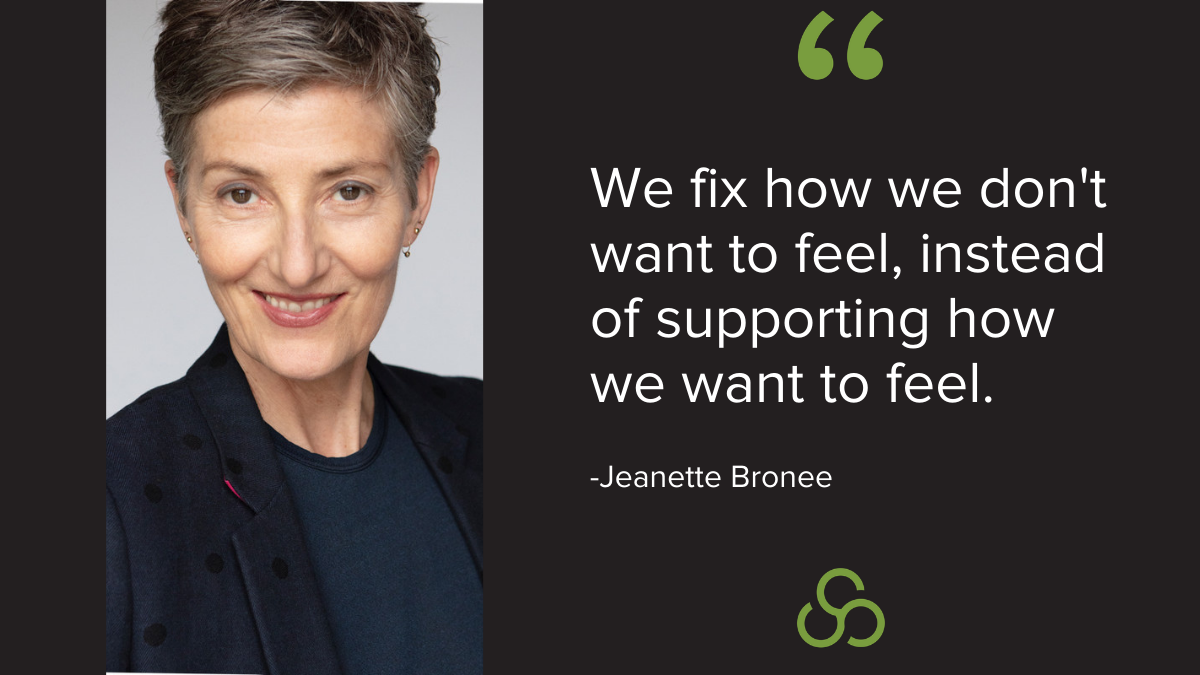
We all do it... We realize that we need to stop and take a break, but we still just push through. Why do we do this?
Learn what Speaker & Self Care expert, Jeanette Bronée, has to say on this topic.
Carole Mahoney:
So we talked a little bit about why so many of us don't do this. What happens? Why do we choose to just keep barreling ahead, instead of the self care, even though in our minds, we know we should be doing this. If I'm more relaxed, if I'm more in tune with what's going on, then I'm going to be better. We know this intuitively, but we still rush right through it all. Why?
Jeanette Bronée:
Part of it is that we're a very result driven culture, which means we miss that it's the process that gets to the result. And it's the people that are part of the process, not the product, that becomes the result. And so if we can look at it a little bit and sit back, and I wanted to comment on two things to the previous question.
One is, there's another hidden cost of not practicing self care, and that's burnout. And that has been a silent crisis for a very, very long time. It's costing billions of dollars, mental health crises that are happening across not only the globe, but in our society, especially with a pandemic like COVID that's hanging over us. We're finally having those conversations. That cost is a whole different, more of an immediate, we can feel it, kind of cost, but that has been a hidden crisis for a long time, partly because we haven't implemented self-care in our daily work lives.
And the part about not listening before, there was one time, I'm not very good on coffee. I talk too much and I don't listen. Because it spikes my cortisol and my adrenaline's running and I feel great! I feel optimal. I'm like, yes, I can do this! Like on top of the world! Except my client one time said to me, "I'm feeling really uncomfortable right now. You're talking at me. You're talking over my head. You're not listening to me. I don't want to have this conversation." And I said, "Whoa, wait a minute. What's going on?" And she goes, "Well, that's how I feel." And I recognized and I said to her, "Oh, wait a minute. I had coffee today, half an hour before we have this meeting..."
Carole Mahoney:
And now it's kicking in.
Jeanette Bronée:
"Now it's kicking in! I am so sorry."
And so what's happening here is that I'm fixing, like I was maybe tired, so I'm fixing tired, but it's costing me the relationship that I could have had with my client. Instead of having known that if I don't get my sleep, I will be a little tired, but I would probably pay more attention. But instead, I'm trying to fix tired by drinking coffee or eating sugar, whatever happens when people do that.
We fix how we don't want to feel, instead of supporting how we want to feel. Like, we want to feel more energy, more focused, paying attention, being able to listen. So if we can shift the mindset that says, wait a minute, how do I want to feel, instead of fixing how I don't want to feel.
It's a slight balance here, but I think it's the same that happens in a sales call, when we're trying to say, "Well, I need you to buy my product," instead of asking, "Well, what do you need so that you can buy my product?"
Carole Mahoney:
Right. That's why we talk about it not being about you, not about your product, but what about them? What do they need? How do they see the solution? Why is it important for them to fix? What happens to them if they don't fix it? Notice how none of those have anything to do with you.
So is that really the first step for us, for leaders to be able to encourage this kind of thing in our workplaces, is to stop not so much focusing on what we don't want, but what do we want, and what leads to what we do want? Is that the first? What else do we need to do?
Jeanette Bronée:
Yes, it's part of the first. But the first part is to understand that we think of self care as something we do when we have time, instead of thinking of self care as how we spend time better, how we engage better with other people, and how we perform better at work.
So self care, instead of being this little thing that's hanging out on the side, that we maybe get to when the day is over and our to-do list is done, instead self care becomes what creates this whole view. Self care is the foundation for how we engage better with other people, do our work, and so on and so forth.
So we think of Maslow's hierarchy of needs as climbing the ladder. And we kind of think that we can get to self realization without the core foundational things. So we're kind of like, we're just going to climb up. That's a very ego perspective. We need an eco perspective, which means if self care is the foundation for how we interact, contribute, and work, then we have impact in the world.
Does this message hit home for you?
The full half hour session with Jeanette is available on demand on BrightTalk! Click here to watch or visit Jeanette's website to learn more. If you'd also like to learn more or take the #notaboutme pledge, click below!







